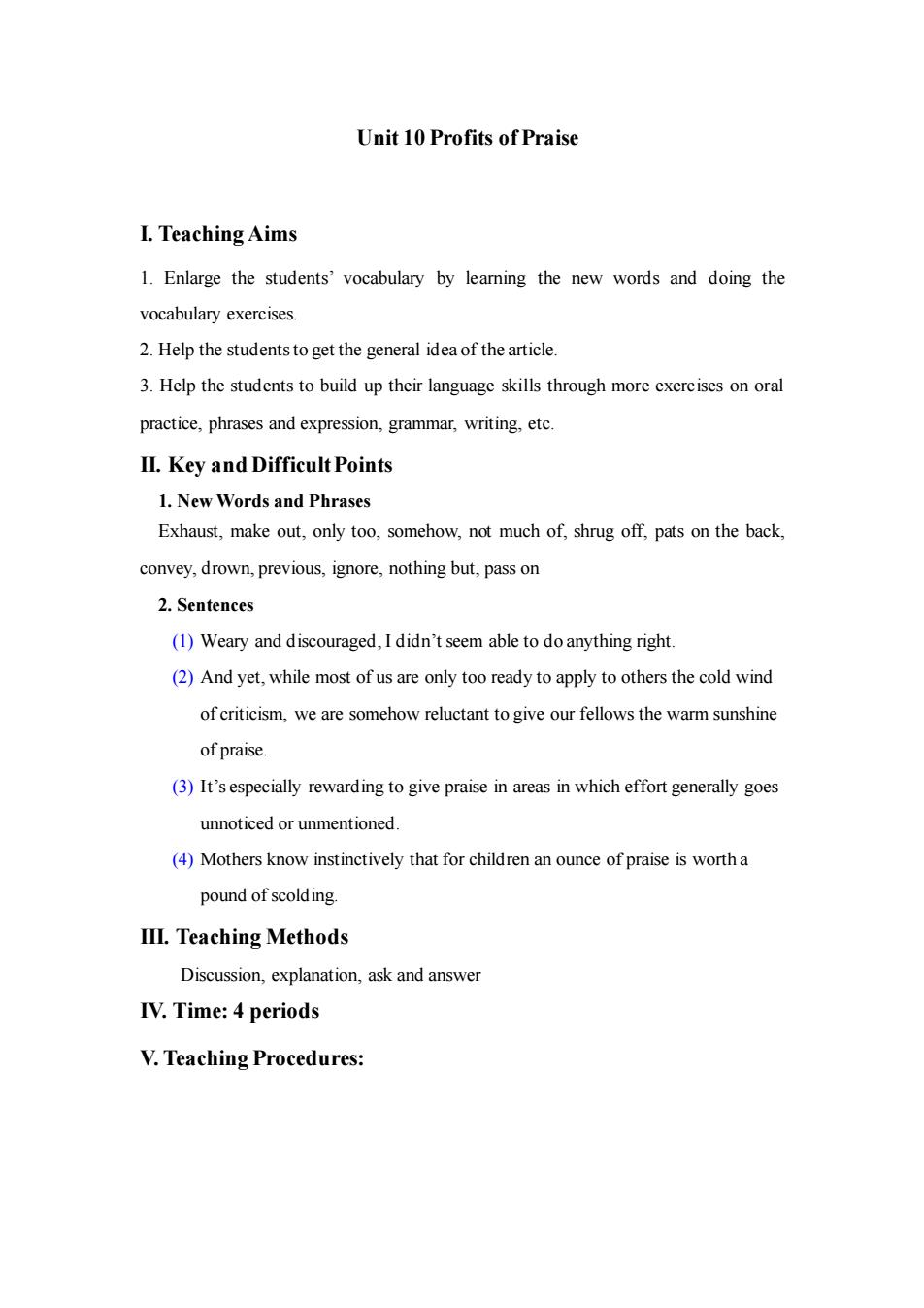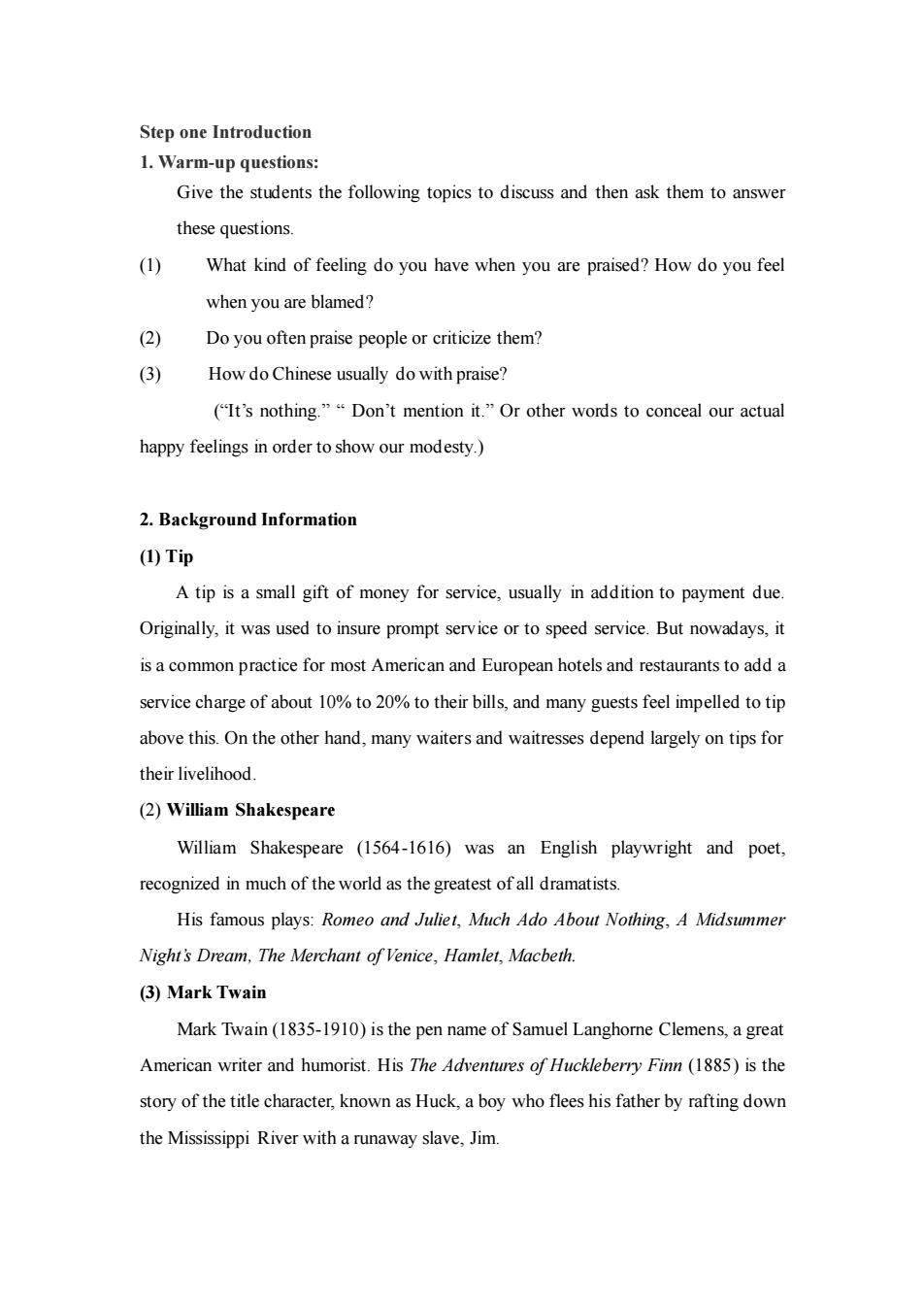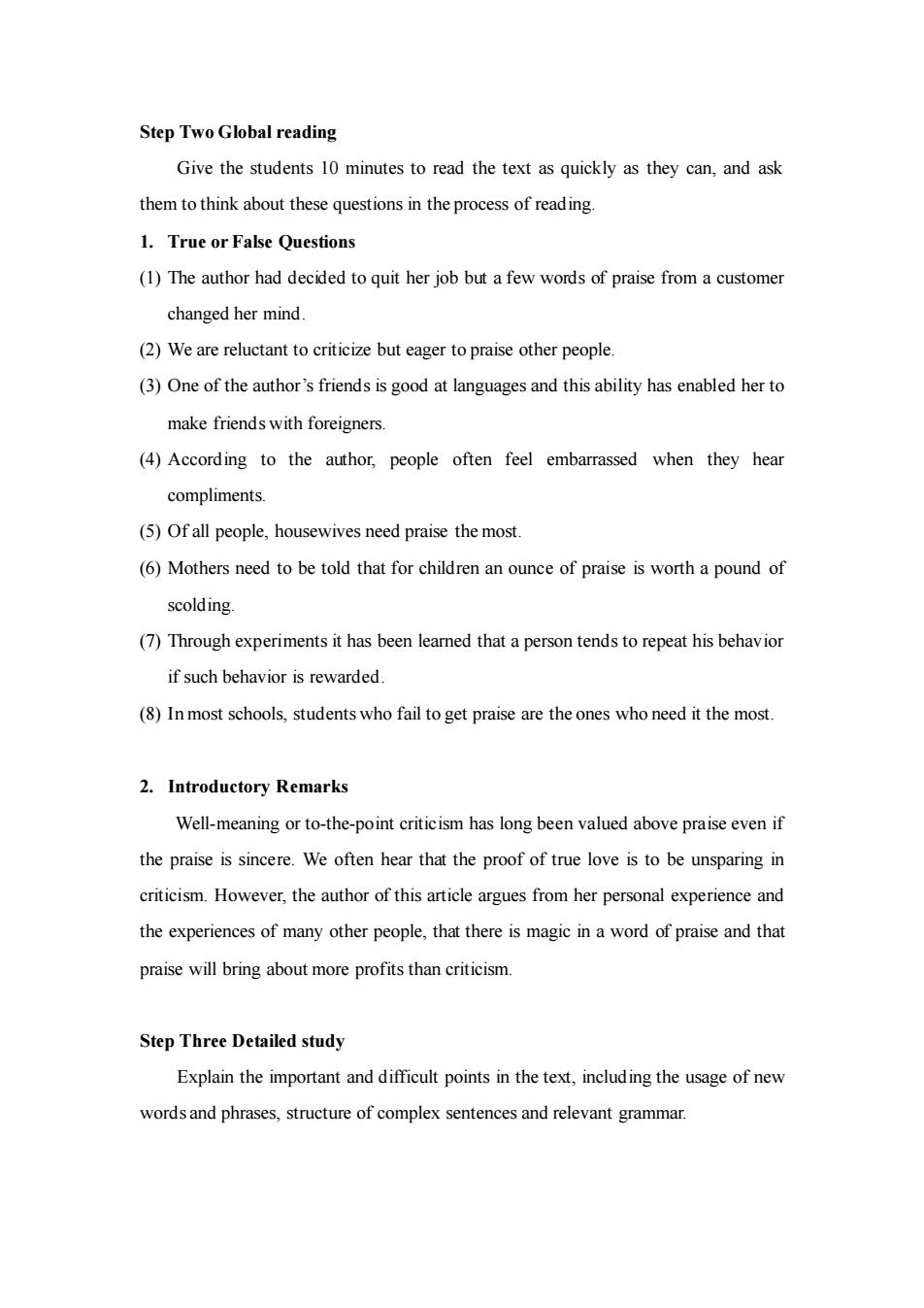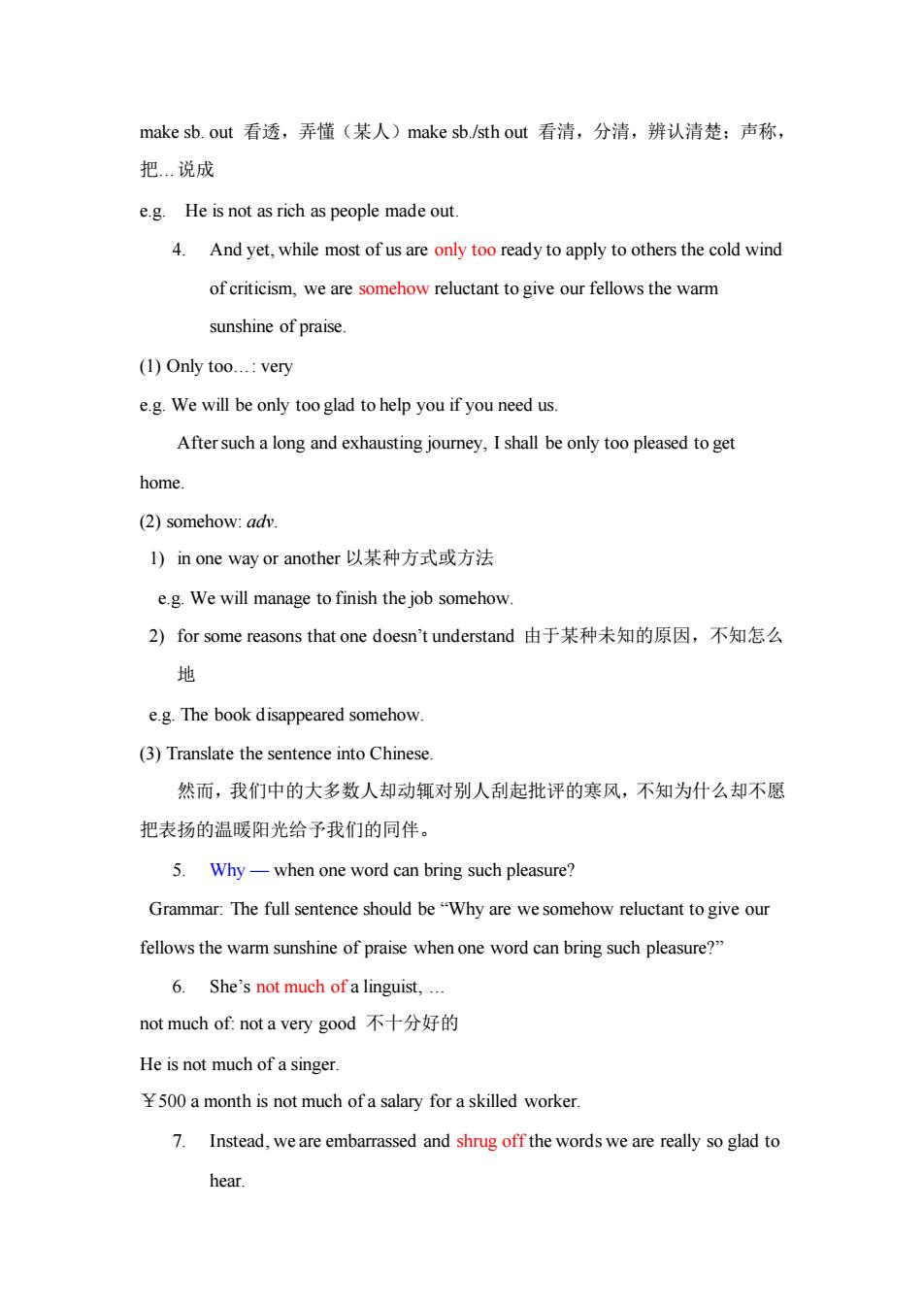
Unit 10 Profits of Praise I.Teaching Aims 1.Enlarge the students'vocabulary by learning the new words and doing the vocabulary exercises. 2.Help the studentstoget the general ideaof thearticle. 3.Help the students to build up their language skills through more exercises on oral practice,phrases and expression,grammar,writing,etc. II.Key and Difficult Points 1.New Words and Phrases Exhaust,make out,only too,somehow,not much of,shrug off,pats on the back. convey,drown,previous,ignore,nothing but,pass on 2.Sentences (1)Weary and discouraged,I didn't seem able to doanything right (2)And yet,while most of us are only too ready to apply to others the cold wind of criticism,we are somehow reluctant to give our fellows the warm sunshine of praise. (3)It's especially rewarding to give praise in areas in which effort generally goes unnoticed or unmentioned. (4)Mothers know instinctively that for children an ounce of praise is wortha pound of scolding. IIL.Teaching Methods Discussion,explanation,ask and answer IV.Time:4 periods V.Teaching Procedures:
Unit 10 Profits of Praise I. Teaching Aims 1. Enlarge the students’ vocabulary by learning the new words and doing the vocabulary exercises. 2. Help the students to get the general idea of the article. 3. Help the students to build up their language skills through more exercises on oral practice, phrases and expression, grammar, writing, etc. II. Key and Difficult Points 1. New Words and Phrases Exhaust, make out, only too, somehow, not much of, shrug off, pats on the back, convey, drown, previous, ignore, nothing but, pass on 2. Sentences (1) Weary and discouraged, I didn’t seem able to do anything right. (2) And yet, while most of us are only too ready to apply to others the cold wind of criticism, we are somehow reluctant to give our fellows the warm sunshine of praise. (3) It’s especially rewarding to give praise in areas in which effort generally goes unnoticed or unmentioned. (4) Mothers know instinctively that for children an ounce of praise is worth a pound of scolding. III. Teaching Methods Discussion, explanation, ask and answer IV. Time: 4 periods V. Teaching Procedures:

Step one Introduction 1.Warm-up questions: Give the students the following topics to discuss and then ask them to answer these questions (1)What kind of feeling do you have when you are praised?How do you feel when you are blamed? (2) Doyou often praise people or criticize them? (3) How do Chinese usually do with praise? ("It's nothing.""Don't mention it."Or other words to conceal our actual happy feelings in order to show our modesty.) 2.Background Information (I)Tip A tip is a small gift of money for service,usually in addition to payment due Originally,it was used to insure prompt service or to speed service.But nowadays,it is a common practice for most American and European hotels and restaurants to add a service charge of about 10%to 20%to their bills,and many guests feel impelled to tip above this.On the other hand,many waiters and waitresses depend largely on tips for their livelihood. (2)William Shakespeare William Shakespeare (1564-1616)was an English playwright and poet. recognized in much of the world as the greatest of all dramatists. His famous plays:Romeo and Juliet,Much Ado About Nothing,A Midsummer Night's Dream,The Merchant of Venice,Hamlet,Macbeth. (③)Mark Twain Mark Twain(1835-1910)is the pen name of Samuel Langhorne Clemens,a great American writer and humorist.His The Adventures of Huckleberry Finn(1885)is the story of the title character,known as Huck,a boy who flees his father by rafting down the Mississippi River with a runaway slave.im
Step one Introduction 1. Warm-up questions: Give the students the following topics to discuss and then ask them to answer these questions. (1) What kind of feeling do you have when you are praised? How do you feel when you are blamed? (2) Do you often praise people or criticize them? (3) How do Chinese usually do with praise? (“It’s nothing.” “ Don’t mention it.” Or other words to conceal our actual happy feelings in order to show our modesty.) 2. Background Information (1) Tip A tip is a small gift of money for service, usually in addition to payment due. Originally, it was used to insure prompt service or to speed service. But nowadays, it is a common practice for most American and European hotels and restaurants to add a service charge of about 10% to 20% to their bills, and many guests feel impelled to tip above this. On the other hand, many waiters and waitresses depend largely on tips for their livelihood. (2) William Shakespeare William Shakespeare (1564-1616) was an English playwright and poet, recognized in much of the world as the greatest of all dramatists. His famous plays: Romeo and Juliet, Much Ado About Nothing, A Midsummer Night’s Dream, The Merchant of Venice, Hamlet, Macbeth. (3) Mark Twain Mark Twain (1835-1910) is the pen name of Samuel Langhorne Clemens, a great American writer and humorist. His The Adventures of Huckleberry Finn (1885) is the story of the title character, known as Huck, a boy who flees his father by rafting down the Mississippi River with a runaway slave, Jim

Step Two Global reading Give the students 10 minutes to read the text as quickly as they can,and ask them to think about these questions in the process of reading. 1.True or False Questions (1)The author had decided to quit her job but a few words of praise from a customer changed her mind. (2)We are reluctant to criticize but eager to praise other people (3)One of the author's friends is good at languages and this ability has enabled her to make friends with foreigners. (4)According to the author,people often feel embarrassed when they hear compliments. (5)Ofall people,housewives need praise the most. (6)Mothers need to be told that for children an ounce of praise is worth a pound of scolding (7)Through experiments it has been leamned that a person tends to repeat his behavior if such behavior is rewarded. (8)In most schools,students who fail to get praise are the ones who need it the most. 2.Introductory Remarks Well-meaning or to-the-point criticism has long been valued above praise even if the praise is sincere.We often hear that the proof of true love is to be unsparing in criticism.However,the author of this article argues from her personal experience and the experiences of many other people,that there is magic in a word of praise and that praise will bring about more profits than criticism Step Three Detailed study Explain the important and difficult points in the text,including the usage of new words and phrases,structure of complex sentences and relevant grammar
Step Two Global reading Give the students 10 minutes to read the text as quickly as they can, and ask them to think about these questions in the process of reading. 1. True or False Questions (1) The author had decided to quit her job but a few words of praise from a customer changed her mind. (2) We are reluctant to criticize but eager to praise other people. (3) One of the author’s friends is good at languages and this ability has enabled her to make friends with foreigners. (4) According to the author, people often feel embarrassed when they hear compliments. (5) Of all people, housewives need praise the most. (6) Mothers need to be told that for children an ounce of praise is worth a pound of scolding. (7) Through experiments it has been learned that a person tends to repeat his behavior if such behavior is rewarded. (8) In most schools, students who fail to get praise are the ones who need it the most. 2. Introductory Remarks Well-meaning or to-the-point criticism has long been valued above praise even if the praise is sincere. We often hear that the proof of true love is to be unsparing in criticism. However, the author of this article argues from her personal experience and the experiences of many other people, that there is magic in a word of praise and that praise will bring about more profits than criticism. Step Three Detailed study Explain the important and difficult points in the text, including the usage of new words and phrases, structure of complex sentences and relevant grammar

1.It was the end of my exhausting first day as waitress in a busy New York restaurant Exhaust I)to make you feel tired使筋疲力尽,使疲惫不堪 e.g Even a short walk exhausted her. 2)use up用完,花光,耗尽 e.g.The King soon exhausted every penny in the national treasury. n.1)waste gases that come out ofa vehicle,an engine,or a machine 2)a pipe through which exhaust gases come out排气管 exhausting adj.making you feel very tired exhausted adj.very tired e.g.The exhausting day really made me completely exhausted The experiment is very time-consuming and exhausting 这项实验既费时又费力。 2.Weary and discouraged,I didn'tseem able to doanything right Grammar:"Weary and discouraged"is used as an adverbial of cause e.g.Modest and easy to approach,Einstein soon put the young visitor at eas Not discouraged by failures,they went on with their experiment. 3.As I made out a complicated check for a family with several children who had changed their ice-cream order a dozen times,I was ready to quit. ()write in a complete form,fill out开具,填写(表格或文件) Could you make out a detailed list for me? The teacher made out a list of books for students to read (2)understand理解,明白(事理) I just couldn't make out how the fire started I can't make out what she wants
1. It was the end of my exhausting first day as waitress in a busy New York restaurant. Exhaust v. 1) to make you feel tired 使筋疲力尽,使疲惫不堪 e.g. Even a short walk exhausted her. 2) use up 用完,花光,耗尽 e.g. The King soon exhausted every penny in the national treasury. n. 1) waste gases that come out of a vehicle, an engine, or a machine 废气 2) a pipe through which exhaust gases come out 排气管 exhausting adj. making you feel very tired exhausted adj. very tired e.g. The exhausting day really made me completely exhausted. The experiment is very time-consuming and exhausting. 这项实验既费时又费力。 2. Weary and discouraged, I didn’t seem able to do anything right. Grammar: “Weary and discouraged” is used as an adverbial of cause. e.g. Modest and easy to approach, Einstein soon put the young visitor at ease. Not discouraged by failures, they went on with their experiment. 3. As I made out a complicated check for a family with several children who had changed their ice-cream order a dozen times, I was ready to quit. (1) write in a complete form, fill out 开具,填写(表格或文件) Could you make out a detailed list for me? The teacher made out a list of books for students to read. (2) understand 理解,明白(事理) I just couldn’t make out how the fire started. I can’t make out what she wants

make sb.out看透,弄懂(某人)make sb./sth out看清,分清,辨认清楚:声称, 把.说成 e.g.He is not as rich as people made out. 4.And yet,while most of us are only too ready to apply to others the cold wind of criticism,we are somehow reluctant to give our fellows the warm sunshine of praise (1)Only too...:very e.g.We will be only too glad to help you if you need us Aftersuch a long and exhausting joumey,I shall be only too pleased to get home (2)somehow:adv. I)in one way or another以某种方式或方法 e.g.We will manage to finish the job somehow. 2)for some reasons that one doesn't understand由于某种未知的原因,不知怎么 地 e.g.The book disappeared somehow. (3)Translate the sentence into Chinese. 然而,我们中的大多数人却动辄对别人刮起批评的寒风,不知为什么却不愿 把表扬的温暖阳光给予我们的同伴。 5.Why-when one word can bring such pleasure? Grammar.The full sentence should be"Why are wesomehow reluctant to give our fellows the warm sunshine of praise when one word can bring such pleasure?" 6.She's not much of a linguist,... not much of:not a very good不十分好的 He is not much of a singer. Y500 a month is not much of a salary for a skilled worker. 7.Instead,weare embarrassed and shrug off the words we are really so glad to hear
make sb. out 看透,弄懂(某人)make sb./sth out 看清,分清,辨认清楚;声称, 把…说成 e.g. He is not as rich as people made out. 4. And yet, while most of us are only too ready to apply to others the cold wind of criticism, we are somehow reluctant to give our fellows the warm sunshine of praise. (1) Only too…: very e.g. We will be only too glad to help you if you need us. After such a long and exhausting journey, I shall be only too pleased to get home. (2) somehow: adv. 1) in one way or another 以某种方式或方法 e.g. We will manage to finish the job somehow. 2) for some reasons that one doesn’t understand 由于某种未知的原因,不知怎么 地 e.g. The book disappeared somehow. (3) Translate the sentence into Chinese. 然而,我们中的大多数人却动辄对别人刮起批评的寒风,不知为什么却不愿 把表扬的温暖阳光给予我们的同伴。 5. Why — when one word can bring such pleasure? Grammar: The full sentence should be “Why are we somehow reluctant to give our fellows the warm sunshine of praise when one word can bring such pleasure?” 6. She’s not much of a linguist, … not much of: not a very good 不十分好的 He is not much of a singer. ¥500 a month is not much of a salary for a skilled worker. 7. Instead, we are embarrassed and shrug off the words we are really so glad to hear